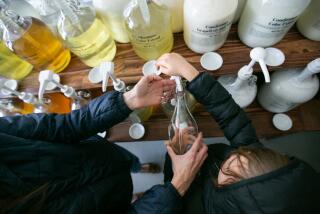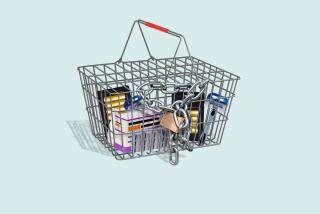A Trip to the Store for Milk, Bread --and Germs?
- Share via
In these germ-phobic times, you begin to wonder: Just how long do you have before lurking viruses and bacteria take you down? Oh, but this is America, land of the pre-moistened towelettes, where scary-sounding microbes--think flesh-eating bacteria, if you will--purportedly can be warded off with a little know-how.
Walk into any Gelson’s market, for instance. At a kiosk near the entrance, you’ll find the kind of free offering that could keep us all from going down the road to a bubbled Biosphere 2: hospital-grade antibacterial wipes to whisk away germs from the handles of shopping carts and baskets.
Executives of the upscale Encino-based grocery chain began planning the towelette service a year ago, before the anthrax scare that prompted many companies to provide antibacterial soaps in restrooms. Talk about hitting the Zeitgeist with surgically gloved precision.
Gelson’s move came at a customer’s suggestion, said company President Bob Stiles. “She’s a very concerned lady about the transference of germs,” he said.
“Germs have become the buzzword for a danger people want to eliminate from their surroundings,” wrote Dr. Stuart B. Levy, a Tufts University microbiologist, in the June 2001 issue of the journal Emerging Infectious Diseases.
According to a July 2000 study by Consumer Reports, more than 700 everyday products labeled “antibacterial” or “disinfectant” were introduced from 1997 to 1999.
Never mind that the American Medical Assn. has asked federal regulators to review products such as antibacterial soaps and similar cleansers to determine whether they pose a health threat by encouraging the growth of super bugs, or resistant microorganisms--and wiping out the so-called good bacteria that help fight off germs. The Soap and Detergent Assn. trade group has countered that such products can kill or inhibit the growth of bacteria such as salmonella and E. coli.
The antibacterial concept is hard to turn away from: the promise of good hygiene in a pocket-sized bottle of multi-tasking “hand sanitizer” gel, with aloe, moisturizers and vitamin E.
Consider the alternative, the experts’ advice on how to potentially protect yourself from getting sick, particularly when those around you have succumbed to a cold or flu: Give your hands a good 30-second scrubbing, using regular soap and paper towels, each time you touch your nose or use the bathroom. That’s the microbiologists’ sound but not very practical equivalent of saying drive at 55 mph--who has that kind of time?
Instead, the public turns to the convenience of antibacterial goods such as the towelettes that Gelson’s began providing six months ago in its 18 stores.
In their search for towelettes that would not cause allergic reactions, company officials decided to tap a pharmaceutical company that provides the same product to hospitals. Of course, there’s no assurance that the wipes will keep a customer in good health, Stiles said. “If you really stop to think about it, there are so many ways [to pick up germs],” he said, such as “money that gets passed back and forth between people.”
The wipes, which cost the company 3 or 4 cents each, also are being used by people who want to clean off their hands or the shopping cart’s child seat. Customer reaction has been overwhelmingly positive, Stiles said. “Gelson’s thinks of everything,” one customer said. In the single negative reaction, a customer said, “You’ve taken it too far. You’ve gone over the edge.”
There’s nothing particularly germ-laden about a shopping cart handle or supermarket, said Dr. Aaron Glatt, chief of infectious diseases at St. Vincent Catholic Medical Centers in New York City. “This is daily life. There are germs all over the place. You can be paranoid, or you can be appropriately cautious.”
So how far will we go in our impossible quest for germ-free living? You can buy the antibacterial SaniGuard, a dry spray that allegedly kills germs on public telephones, gym equipment and other possibly contaminated items. You can hang Air Supply, “the world’s first wearable air purifier,” around your neck so that “viruses and bacteria ... are molecularly destroyed.” You can avoid shaking hands or touching someone on the arm.
And then you can figure out how to explain to children that everyday human contact really is not such a very bad idea.
More to Read
Eat your way across L.A.
Get our weekly Tasting Notes newsletter for reviews, news and more.
You may occasionally receive promotional content from the Los Angeles Times.








